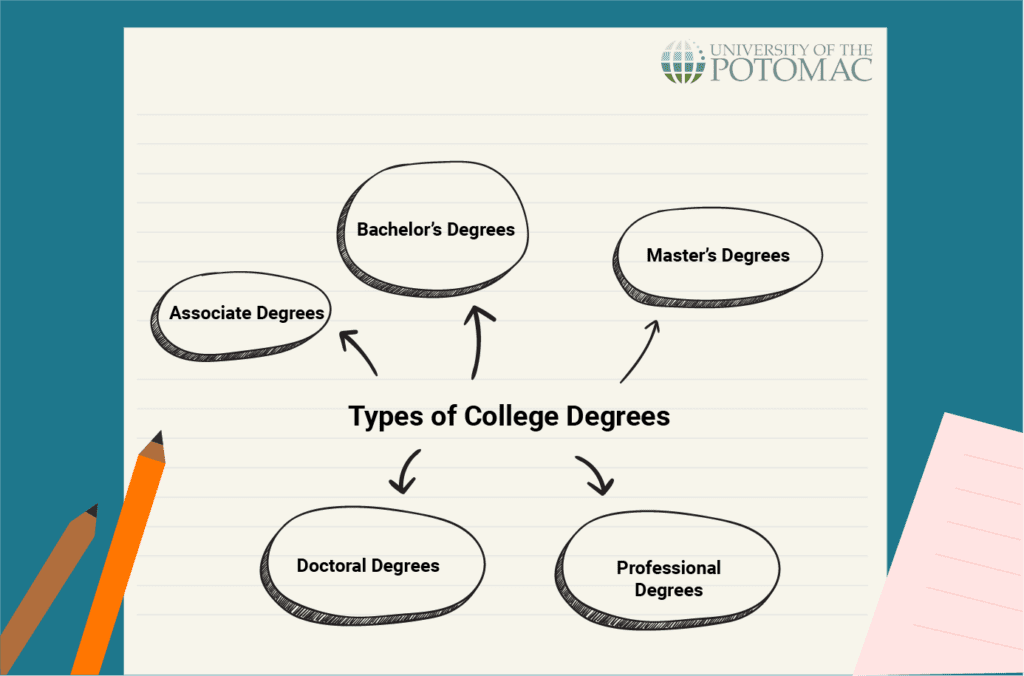
When you first embark on your educational journey, college appears to be a distant horizon. However, in what feels like the blink of an eye, high school graduation arrives, and you are suddenly confronted with the task of shaping your future. The array of college degrees, institutions, and programs available can be both exciting and overwhelming. What once seemed remote is now a critical decision that will steer the course of your life. As you transition into higher education, a crucial step is to acquaint yourself with the many different types of college degrees that lie before you. So, read on and learn more about each type of college degree and what to look for when choosing.
Types of College Degrees

Aspiring learners have a diverse range of academic degrees and majors to choose from in higher education. Some degrees are available directly after high school, while others require completion of undergraduate degrees. Below, we’ll go through different types of college degrees to help you better understand their unique trajectories and find your path to success.
Associate’s Degrees
An Associate’s degree is an undergraduate degree that you can take after high school as the first step in higher education. Such a degree program typically takes two years to complete. They are often categorized as Associate of Arts (A.A.) or Associate of Science (A.S.), tailored to arts and sciences, respectively.
In the United States, you can pursue Associate’s Degrees through various educational institutions, including community colleges, junior colleges, technical colleges, affiliated colleges, and university institutes. Such a degree aims to provide you with basic technical knowledge, academic understanding, and skills you can use for entry-level positions or a smooth transition into further education.
Bachelor’s Degrees
A Bachelor’s degree is another undergraduate degree that is typically more comprehensive and in-depth than an Associate’s degree. It usually takes four years to complete and spans various disciplines, including arts, sciences, humanities, and engineering. That being said, there are different types of Bachelor’s degrees, such as Bachelor of Science (B.S.), Bachelor of Arts (B.A.), Bachelor of Mechanical Engineering (B.M.E.), Bachelor of Biomedical Engineering (B.B.m.E.), and so forth.
The curriculum of such a degree generally goes beyond foundational knowledge and encompasses specialized courses, research opportunities, and broader learning experiences that improve critical thinking and communication skills. Bachelor’s degrees are designed to provide students with a deep understanding of their chosen field and a broader perspective on the world, making them well-prepared for diverse career opportunities or further academic pursuits at the Master’s or Doctoral level.
Master’s Degrees
A Master’s degree is a graduate-level degree representing a more advanced academic accomplishment you can pursue after completing a Bachelor’s degree. Such degrees are typically completed within one to three years of intensive study and research, as they are designed to provide specialized knowledge, advanced skills, and expertise in a particular field.
Higher education institutions offer Master’s degrees across various disciplines, including business, science, humanities, and social sciences. The curriculum often includes a combination of advanced coursework, research projects, and sometimes practical experiences like internships or laboratory work. Therefore, earning such a degree can significantly enhance career prospects, opening doors to higher-paying positions and leadership roles as well as serving as a stepping stone for students interested in pursuing doctoral studies or advancing their expertise in a specialized area.
Doctoral Degrees
A Doctoral degree, often referred to as a Ph.D. (Doctor of Philosophy) or other specific titles like Doctor of Medicine (M.D.) or Juris Doctor (J.D.), represents the highest level of academic achievement in a chosen field. These programs are typically pursued after completing a Master’s and Bachelor’s degree, with varying durations ranging from three to seven years, depending on the discipline and research involved.
Doctoral degrees are characterized by their emphasis on original research and the creation of new knowledge. Doctoral candidates engage in an in-depth exploration of their chosen area of study, conducting extensive research and contributing groundbreaking insights to their field. This often culminates in the completion of a dissertation or thesis, which is a substantial written work presenting the candidate’s original research findings.
Professional Degrees
A professional degree is another advanced credential designed to prepare individuals for specific careers or specialized professions that require in-depth expertise and practical skills. These degrees are distinguishable from traditional academic degrees because they focus on hands-on training, experiential learning, and practical skills over theory and analysis.
These degrees typically follow a Bachelor’s degree completion and vary in duration depending on the program. They aim to equip graduates with knowledge, skills, and ethical understanding to excel in their field and meet the demands of their profession, whether it’s diagnosis, legal representation, medication dispensation, or animal care.
Which One Is For You?
Choosing the right college degree is important beyond shaping your academic path: it profoundly impacts your future career and life trajectory. Each degree type offers distinct advantages. Therefore, assessing factors like job market demands, financial considerations, and program duration is crucial to effectively pinpoint the ideal fit that aligns with your goals and aspirations.
Career Goals and Job Market Demand
Aligning your chosen degree with your career goals is essential for long-term success. Therefore, we suggest you research job market trends and demand for professionals in your field of interest, given that some careers may require specific degrees while others may offer various options.
A Bachelor’s degree might be sufficient for entry-level roles, while other, more advanced positions might necessitate a Master’s or Doctoral degree. By understanding the job market demands for professionals in your chosen field and the qualifications needed to excel, you can make an informed decision that maximizes your employment prospects.
Financial Considerations
While pursuing a field you’re genuinely interested in and passionate about should be a primary consideration when choosing a college degree, it’s crucial to acknowledge the role of financial considerations in this decision-making process.
Recognizing the financial return on investment is significant since education involves substantial financial resources, time, and effort. Therefore, weighing the earning potential, job prospects, and demand in your chosen field together with factors such as tuition, living expenses, potential student loans, and financial aid options will help ensure that your educational journey doesn’t just fulfill your aspirations but also provides a meaningful return on your investment.
Duration of Study
The duration of a degree is another factor to consider, as it directly impacts your academic journey and long-term goals, especially if you are looking for ways to graduate early. The time you invest in it influences various aspects of your life, including finances, career plans, and personal aspirations.
Choosing a degree with a shorter duration, such as an Associate’s degree, might allow you to enter the workforce sooner, gaining practical experience and financial independence earlier. On the other hand, pursuing a more extended degree program, like a Bachelor’s or Master’s degree, might equip you with a more in-depth education and access to advanced career opportunities.
Understanding the duration of a degree helps you align your academic path with your overall life plan, enabling you to make informed decisions about when to start working.
Dynamic Shift: Emergence of New and Hybrid Degrees
Technology is changing fast, and the job market is, too. Because of this, colleges and universities are adapting to ensure their students are ready for the real world after they finish their studies. They are developing new and creative ideas to give students the necessary skills and knowledge by blending conventional and contemporary subjects to meet evolving industry demands. Below, we’ll see how higher education institutions are evolving and preparing students to confidently step into the working world, ready for whatever comes their way.
Interested in pursuing a degree?
Fill out the form and get all admission information you need regarding your chosen program.
This will only take a moment.
Message Received!
Thank you for reaching out to us. We will review your message and get right back to you within 24 hours.
If there is an urgent matter and you need to speak to someone immediately you can call at the following phone number:
- We value your privacy.
Interdisciplinary Degrees

An interdisciplinary studies degree combines two or more fields of study at the undergraduate or graduate level. It is suited for students who wish to create a unique path with a specific objective or explore connections between different subjects.
Interdisciplinary degrees offer a dynamic and flexible curriculum, weaving together multiple fields of study to empower students to craft a broader educational journey. This skill set positions graduates as valuable contributors who can seamlessly transition between roles and tasks that require a cross-functional approach.
Niche Specializations
The landscape of higher education is adapting to specialized industries by introducing tailored niche specializations within established degree programs. These paths align with emerging trends, cutting-edge technologies, and the precise requirements of professions.
For example, the demand for cybersecurity experts has surged as technology advances. Institutions have created specialized tracks to train professionals in safeguarding digital assets and thwarting cyber threats. Similarly, architecture has seen a growing emphasis on sustainable design principles, leading to specializations that teach students to create environmentally friendly structures.
Such specialized tracks enable students to excel in high-demand areas, emerging with theoretical knowledge and practical skills that boost employability. Graduates become leaders and innovators, shaping industries and driving progress globally.
Technological Integration
The emergence of advanced technologies has transformed the boundaries of traditional education, providing students with various virtual platforms and online tools that offer accessibility and flexibility in degree programs. Students can conduct scientific experiments from home with virtual labs and coding boot camps integrated into business degrees to prepare them for technology-driven industries.
Graduates who engage in technology-enhanced learning gain proficiency in digital tools and a deeper understanding of digital ecosystems. These competencies are beneficial beyond the current situation, as graduates can adapt to ever-evolving tech trends and remain agile and relevant in a perpetually changing digital world. Technological integrations in degree programs demonstrate education’s commitment to aligning with industry demands, empowering graduates with the theoretical knowledge and pragmatic skills to drive innovation globally.
Conclusion
Whether you’re intrigued by the immersive exploration of an interdisciplinary degree, aspiring to specialize within evolving industries, embracing technological integrations, or envisioning pursuing a Doctoral or professional degree, your academic path is yours to carve. As you navigate these possibilities, remember that higher education is not solely a stepping stone; it’s a vessel that can carry your passions, goals, and aspirations toward a fulfilling and impactful tomorrow. So, explore the diverse range of programs at Potomac and begin charting your course to a brighter future.
Frequently Asked Questions (FAQ):
What kinds of college degrees can I choose from?
You have a variety of college degrees to choose from, such as Associate’s, Bachelor’s, Master’s, and Doctoral degrees. Additionally, there are professional degrees that emphasize practical skills more than theory and analysis.
What is the difference between Associate’s and Bachelor’s degrees?
An Associate’s degree is typically a two-year program offered by community colleges, whereas a Bachelor’s degree usually takes four years to complete at universities. Moreover, Bachelor’s degrees tend to cover a broader range of subjects and provide more detailed and comprehensive learning than associate degrees.
What’s a Master’s degree, and how is it different from a Bachelor’s?
A Master’s degree is an advanced degree you can pursue once you’ve obtained a Bachelor’s degree. It involves more focused study and typically takes one to three years to complete, offering expertise within a particular field.
How can I choose a degree that will give me a good job?
To find a degree that leads to a good job, research the job market demand for different fields. Choose a degree that will lead to positions with solid job prospects and growth potential.
How can I find a degree that matches what I love to do?
Research degree programs related to your interests and hobbies so you can study what you enjoy.
What are hybrid degrees?
Hybrid degrees combine different subjects to create a unique program. They let you explore your interests from multiple angles, giving you a broader skill set.
How many years is a Doctoral degree?
A Doctoral degree usually takes around three to seven years, depending on the field and research involved.
How has technology shaped college degrees?
Technology has revolutionized education, with online classes and digital tools making learning more accessible. Hybrid programs and technology also enhance the college experience.
Can I study both science and art in one degree?
Yes, some degrees offer interdisciplinary programs that blend science and art. These programs help you explore different areas and gain a broader perspective.










